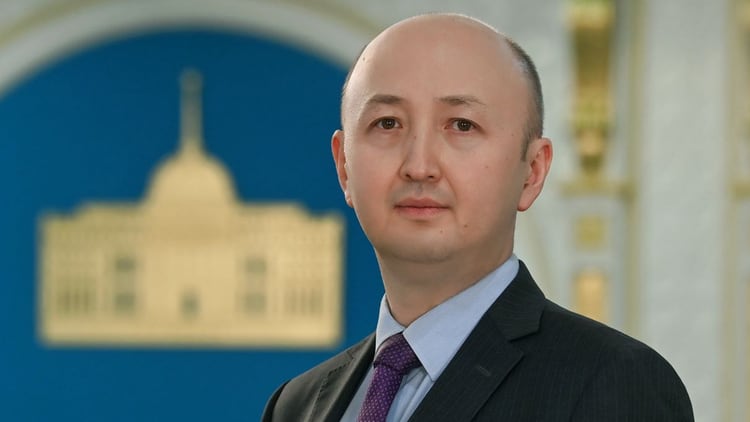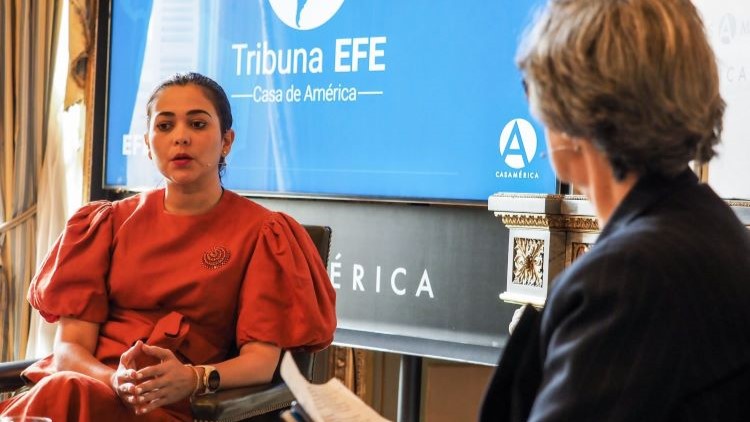Danat Mussayev
Kazakhstan’s Ambassador to Spain
Luis Ayllón
Kazakhstan’s ambassador Danat Mussayev, who recently took up his post in Madrid, after he was previously posted to Spain as Consul in Barcelona, stresses in an interview with The Diplomat, on the eve of the parliamentary elections on Sunday 19, that they are a step forward in the process of modernising his country’s political system, which is opening up to a new era.
What is the situation in Kazakhstan after the events of January last year?
Just over a year ago, our country suffered a violent coup attempt planned by groups of people who wanted to see our nation fall. There was a real possibility that the Kazakh state would collapse, and the echoes of what happened would have consequences far beyond the borders of Central Asia. Fortunately, Kazakhstan has not only managed to recover from the wounds of the January 2022 events, but has also further strengthened the foundations of state administration through political and socio-economic development. Today the country is completely unrecognisable. The constitutional amendments introduced as a result of the national referendum held in June 2022 opened a path towards new democratic principles in our country, including the increased weight of the Parliament, the limitation of presidential powers, the simplification of registration procedures for new political parties, direct elections of rural mayors and other important measures.
In this democratisation of the political system that you are talking about, what are the most important measures that have been adopted?
In January this year, several political initiatives were adopted. Perhaps the most significant is the establishment of the Constitutional Court, to which any Kazakh citizen, the Commissioner for Human Rights and the Prosecutor General can appeal. The Court will ensure the conformity of the country’s laws with the Constitution and guarantee the protection of the fundamental rights of our citizens. The first chairperson of the Constitutional Court, Elvira Azimova, previously held the position of the Ombudsman of Kazakhstan. This is an important testimony of the priorities and the line of work of the Constitutional Court.
What is new in the elections on the 19th and which parties are standing in the elections?
Today Kazakhstan is on the verge of early elections of deputies to the lower house of parliament, the Mazhilis, and local representative bodies, the Maslikhats. These elections will be exceptional in many respects. First of all, two newly created political parties will participate in the vote, in addition to the five existing ones. Thus, at the end of 2022 in Kazakhstan, the Green Party was created, whose main intention is to draw attention to environmental problems. Its agenda is particularly important in the context of serious challenges in the fight against climate change, and also of great concern for our citizens in light of the lingering consequences of large-scale environmental disasters caused by human activity in the Soviet era.
Today there are seven registered parties in the country offering the electorate a wide range of voting options. The participation of these parties in competitive elections in the future will strengthen the multi-party system, developing the potential of political pluralism and opposition politics, a goal that our country has been steadily advancing in recent years. Importantly, the threshold for parties to pass to the Mazhilís has been lowered from 7% to 5%, which makes it easier for new parties to enter parliament and plays an important role in improving the accountability of the government.
Secondly, for the first time since 2004, the Mazhilís elections will use a mixed proportional majority model, whereby 70% of MPs will be elected proportionally by party lists and 30% by majority single-member constituencies. This means that 29 of the 98 members of the Mazhilis of Parliament will be elected by single-member constituencies, while 69 will be elected by party lists. Elections to maslikhats in districts and towns of republican significance will also be conducted according to a mixed electoral system with a 50/50 ratio, while in lower-level maslikhats deputies will be elected entirely on a majority basis.
In addition, an “against all” box has been included on the ballot papers, which will allow voters, if they so wish, to express their disapproval of all nominated candidates. Finally, in allocating the mandates of parliamentarians to party lists, a 30 per cent quota for women, youth and persons with special needs has been established at the legislative level. This measure ensures greater representation of all groups in Parliament.
What role will international observers play in the elections?
Our country has always expressed its commitment to free, transparent and fair elections. The role of election observers is indeed crucial. As with previous elections, including the November 2022 presidential election, we have invited 10 international organisations and dozens of foreign observers to monitor the electoral process. We expect an observer mission from the Office for Democratic Institutions and Human Rights (ODIHR/OSCE), as well as from the Commonwealth of Independent States.
What are the expectations for the country after the elections?
The upcoming elections will mark another important milestone in the development of Kazakhstan’s democracy. Many were unsure whether our country would recover from the unrest in January 2022. However, we managed to overcome that obstacle. In addition to demonstrating our resilience and stability, we have transformed our country through important political and socio-economic initiatives.
Of course, the elections will not change our country overnight, but they will further contribute to the creation of a just Kazakhstan, a prosperous society with a bright, dynamic and competitive political system. Such a country will be an even stronger and more committed partner for the international community, including for Spain.
As the world continues to overcome today’s geopolitical and geo-economic challenges, a stable and prosperous Kazakhstan serves the interests not only of its own citizens, but also far beyond the borders of its region. Our political reforms, backed by competitive elections, are the basis through which we will secure our stability and continue to build our future.
On the eve of the general elections, how is Kazakhstan experiencing the situation caused by Russia’s invasion of Ukraine, and do you think that this situation may have some impact on the election results
First of all, Kazakhstan welcomes the position of the People’s Republic of China on the political settlement of the Ukrainian crisis, which deserves support as it contributes to ending the bloodshed on the basis of territorial integrity, independence and sovereignty of states in accordance with the fundamental principles of the UN Charter. We believe that there is no alternative to a peaceful solution of this problem solely on the basis of international law and the principles of the UN Charter.
Moreover, in the current geopolitical environment, we constantly reinforce our statehood, steadfastly pursuing the course of reform and renewal. The upcoming elections are an important step in strengthening our state institutions and stability.
Spain and Kazakhstan have increased their economic exchanges in recent years. Do you think that this increase is sufficient or do you think there are any areas in which the experience of Spanish companies could be important for your country?
Yes, that is true. According to the data we have, the expansion of trade, economic and investment cooperation is quite obvious. Last year alone, trade reached $2.6 billion, 41.7% more than in the same period of 2021, which was $1.828 billion.
The growth of Kazakhstan’s exports to Spain is justified by an increase in the supply not only of oil, which is 40.6 %, but also of goods such as ferroalloys, electric generators, where we could highlight a growth in 22.3 times, and also the sectors with the multiple growth, transmission mechanisms for machines, equipment and vehicles. New export products of Kazakhstan have also appeared in the structure of turnover: unwrought aluminium, dried vegetables, coal, etc.
The general outline shows that our country is ready to expand and diversify its turnover, taking into account the needs of the Spanish side. I would like to point out that, in the current geopolitical and geo-economic realities, Kazakhstan is developing an alternative logistics route for the transport of goods from Europe to Asia and vice versa: the Trans-Caspian International Transport Route or the “Middle Corridor”. The route runs through China, Kazakhstan, the Caspian Sea, Azerbaijan, Georgia and beyond to Turkey and European countries. The lead time for the delivery of goods from China to Black Sea ports under the “Middle Corridor” has already been reduced from 38-53 to 19-23 days, and by the end of this year it should reach 14-18 days.
Taking into account Spain’s strengths, the sectors of the economy on which the search for technological partners, potential investors and co-investors is focused are identified: agro-industrial sector, production of automotive components, machine tools, metal-mechanics, transport infrastructure, renewable energy, pharmaceuticals, environment, biotechnology, construction, engineering, digital technologies, defence and aerospace.
We see potential to expand investment cooperation. By the three quarters of 2022, $16.5 billion was attracted to Kazakhstan’s economy. By the end of 2021 $14.8 billion.
Some Spanish companies have already been present in Kazakhstan for years…
Indeed. Kazakhstan is in the constant focus of Spanish business. Renowned companies such as Airbus, Maxam, Talgo, Anka Group, Inditex, Pronovias, Cortefiel, Desigual, Mango, Joma, etc. are already operating in our market. But we are not resting on our laurels; we are working on a series of new projects with Spain. I take advantage of our conversation to invite Spanish companies to participate in the next meeting of the Business Council “Kazakhstan-Spain”, which will be held on 30 May 2023 in Astana. In addition, Spanish business circles can visit the Astana International Forum to be held on 8-9 June, as well as the Kazakhstan Industrialisation Week on 10-12 May.
Are there any upcoming high-level exchanges of visits between Spain and Kazakhstan?
Strategic relations between Kazakhstan and Spain are always accompanied by high-level visits. This year we are planning an official visit of the Spanish Minister of Foreign Affairs, EU and Cooperation, José Manuel Albares, to Astana. Unfortunately I cannot tell you when this would take place as we are still working on the dates of the trip.







